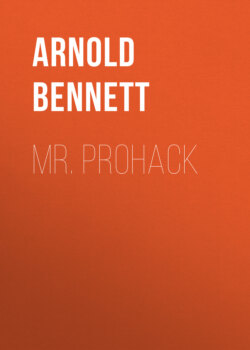Читать книгу Mr. Prohack - Arnold Bennett - Страница 18
На сайте Литреса книга снята с продажи.
III
ОглавлениеTable of Contents
He offered no remark as to the car, and Mr. Prohack offered no remark. But Mr. Prohack was very interested in the car—he who had never been interested in cars. And he was interested in the clothes and in the deportment of the chauffeur. He was indeed interested in all sorts of new things. The window of a firm of house-agents who specialised in country houses, the jewellers' shops, the big hotels, the advertisements of theatres and concerts, the establishments of trunk-makers and of historic second-hand booksellers and of equally historic wine-merchants. He saw them all with a fresh eye. London suddenly opened to him its possibilities as a bud opens its petals.
"Not a bad car they; hired out to me," said Bishop at length, with casual approval.
"You've hired it?"
"Oh, yes!"
And shortly afterwards Bishop said:
"It's fantastic the number of cars there are in use in America. You know it's a literal fact that almost every American family has a car. For instance, whenever there's a big meeting of strikers in New York, all the streets near the hall are blocked with cars."
Mr. Prohack had food for reflection. His outlook upon life was changed.
And later Bishop said, again apropos of nothing:
"Of course it's only too true that the value of money has fallen by about half. But on the other hand interest has about doubled. You can get ten per cent on quite safe security in these days. Even Governments have to pay about seven—as you know."
"Yes," concurred Mr. Prohack.
Ten thousand pounds a year!
And then he thought:
"What an infernal nuisance it would be if there was a revolution! Oh! But there couldn't be. It's unthinkable. Revolution everywhere, yes; but not in England or America!"
And he saw with the most sane and steady insight that the final duty of a Government was to keep order. Change there must be, but let change come gradually. Injustices must be remedied, naturally, but without any upheaval! Yet in the club some of the cronies (and he among them), after inveighing against profiteers and against the covetousness of trades unions, had often held that "a good red revolution" was the only way of knocking sense into the heads of these two classes.
The car got involved in a block of traffic near the Mansion House, and rain began to fall. The two occupants of the car watched each other surreptitiously, mutually suspicious, like dogs. Scraps of talk were separated by long intervals. Mr. Prohack wondered what the deuce Softly Bishop had done that Angmering should leave him a hundred thousand pounds. He tried to feel grief for the tragic and untimely death of his old friend Angmering, and failed. No doubt the failure was due to the fact that he had not seen Angmering for so many years.
At last Mr. Prohack, his hands in his pockets, his legs stretched out, his gaze uplifted, he said suddenly:
"I suppose it'll hold water?"
"What? The roof of the car?"
"No. The will."
Mr. Softly Bishop gave a short laugh, but made no other answer.
